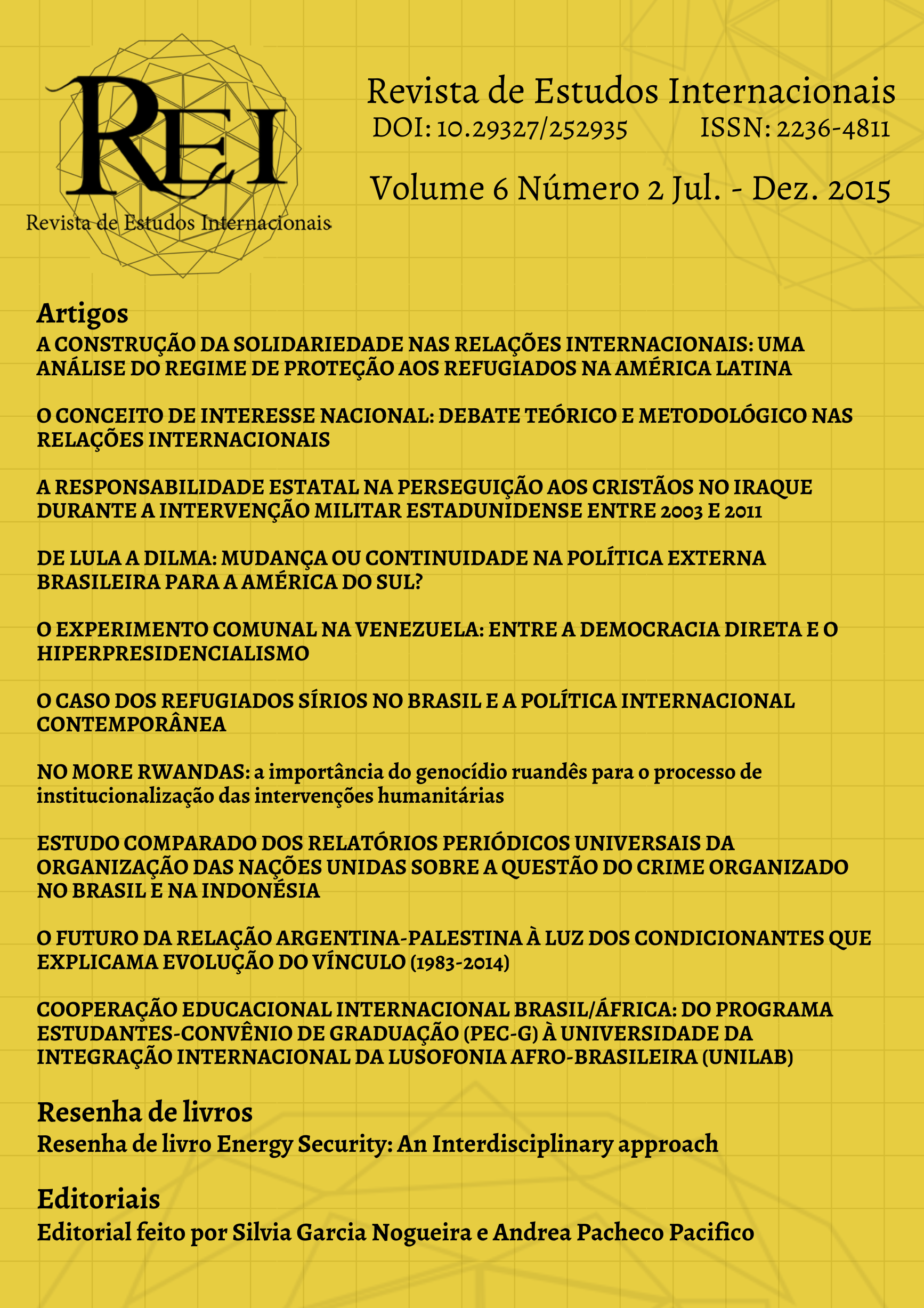NO MORE RWANDAS: a importância do genocídio ruandês para o processo de institucionalização das intervenções humanitárias
Palavras-chave:
Intervenções Humanitárias, Processo de Institucionalização, Genocídio em Ruanda, Responsabilidade de ProtegerResumo
Este artigo tem como intuito avaliar o papel do genocídio ruandês no processo de institucionalização de uma norma de intervenção humanitária no seio da ONU. Primeiramente, por meio de fontes secundárias, ele trata da ascensão do uso da força para a proteção dos direitos humanos no pós-Guerra Fria, dando ênfase ao caso particular de Ruanda e suas nuanças. Em seguida, por meio de um levantamento empírico de documentos, busca-se demonstrar como o genocídio esteve presente nos documentos onusianos que trataram da ideia de relativização dos princípios da soberania e não-intervenção em nome da proteção dos direitos humanos. Ao final, como resultado, é possível perceber o efeito moral que o genocídio naquele país africano vem tendo sobre a emergência normativa das intervenções humanitárias.
Referências
BULL, Hedley (1966). International Theory: The Case for a Classical Approach. World Politics, 18 (3): 361-77.
_____. (2002). Sociedade Anárquica: um estudo da ordem na política mundial. Trad. Sérgio Bath. Brasília: Editora Universidade de Brasília.
BUZAN, Barry (2001). An Underexploited Resource in IR. Review of International Studies, 27 (3): 471- 88.
BUZAN, Barry et al. (1998). Security: A New Framework for Analysis. London: Rienner.
COMISSION ON HUMAN SECURITY (2003). Human Security Now. Nova York: Comission on Human Security.
DESFORGES, Alison ( 1999). Leave None to Tell the Story: Genocide in Rwanda. Human Rights Watch, 1999. Publicado em [http://www.hrw.org/en/reports/1999/03/01/leave-none-tell-story]. Disponibilidade: 01/08/2014.
DONNELLY, Jack (1995). State Sovereignty and International Intervention: The Case of Human Rights. In LYONS, Gene M & MASTANDUNO, Michael (eds). Beyond Westphalia? State Sovereignty and International Intervention. Baltimore: The Johns Hopkins University Press, 115-46.
FINNEMORE, Martha (2003). The purpose of intervention: Changing beliefs about the use of force. New York: Cornell University Press.
HOLZGREFE, J. L. (2003). The Humanitarian Intervention debate.. In HOLZGREFE, J. L; KEOHANE, Robert O (eds). Humanitarian Intervention: Ethical, Legal, and Political Dilemmas. Cambridge: Cambridge University Press, 15-52.
HURRELL, Andrew (2007). On Global Order: power, values and constitution of international order. New York: Oxford.
INTERNATIONAL COMISSION ON INTERVENTION AND STATE SOVEREIGNTY (ICISS) (2001). The responsibility to protect. Canada: International Development Research Centre.
JACKSON, Robert (1995). International Community beyond the Cold War. In: LYONS, Gene M. e MASTANDUNO, Michael (Ed.). Beyond Westphalia? State Sovereignty and International Intervention. Baltimore: The John Hopkins University Press, p. 59-86.
JOHNSTONE, Ian (2003). The Role of the UN Secretary-general: The Power of Persuasion Based on Law. Global Governance, 9 (4): 441-58.
LINKLATER, Andrew; SUGANAMI, Hidemi (2006). The English School of International Relations: A Contemporary Reassessment. Cambridge: Cambridge University Press.
MAYALL, James (2006). Humanitarian Intervention and International Society: Lessons from Africa. In WELSH, M. (eds.). Humanitarian Interventions and International Relations. Oxford: Oxford University Press, 120-41.
ONU (1945). Carta das Nações Unidas, publicada em [http://www.planalto.gov.br/ccivil_03/decreto/1930-1949/d19841.htm]. Disponibilidade: 30/10/2015.
____ (1994). Resolução 929 do Conselho de Segurança, publicada em [http://www.un.org/documents/scres.htm]. Disponibilidade: 02/08/2013.
______(2000). We the peoples: the role of United Nations in the 21st century. Report of Secretary General, publicado em [http://www.un.org/millennium/sg/report/full.htm]. Disponibilidade: 27/06/ 2014.
_____(2004a). A more secure world: our shared responsibility. Report of the Secretary General’s high-level panel on threats, challenges and change. A/65/565.
_____(2004b). Memorial Conference On Rwanda Genocide Considers Ways To Ensure more Effective International Response In Future, publicado em [http://www.un.org/News/Press/docs/2004/afr868.doc.htm]. Disponbilidade: 15/06/2014.
_____(2005). World Summit Outcome. A/60/ L.1.
_____(2007). On Anniversary Of Rwanda Genocide, Secretary-General Says Current Challenge Is To Make Responsibility To Protect Operational, publicado em [http://www.un.org/News/Press/docs/2007/sgsm10934.doc.htm]. Disponibilidade: 12/06/2014.
_____(2008). United Nations Has Moral Duty To Act On Lessons Of Rwanda, Says Secretary-General In Message To Mark Fourteenth Anniversary Of 1994 Genocide. Publicado em [http://www.un.org/News/Press/docs/2008/sgsm11495.doc.htm]. Disponibilidade: 27/08/2014.
_____ (2009) Implementing the responsibility to protect. Report of Secretary General. A/63/677, publicado em [http://www.un.org/News/Press/docs/2008]. Disponibilidade: 20/06/2013.
PINTO, Simone Rocha Valente (1996). As Nações Unidas e a Intervenção Humanitária no Pós- Guerra Fria: Aspectos Jurídicos.. Dissertação deMestrado em Relações Internacionais, apresentada ao Instituto de Relações Internacionais da Pontifícia Universidade Católica do Rio de Janeiro (Orientador: Gustavo Senechal de Goffredo).
RODRIGUES, Simone Martins (2000). Segurança internacional e direitos humanos: a prática da intervenção humanitária no Pós-Guerra Fria. Rio de Janeiro: Renovar.
WHEELER, Nicholas J. (2000). Saving Strangers: Humanitarian Intervention in International Society. Oxford: Oxford University Press.
(2006). The Humanitarian Responsibilities of Sovereignty: Explaining the Development of a New Norm of Military Intervention for Humanitarian Purposes in International Society. In WELSH, M. (eds.). Humanitarian Interventions and International Relations. Oxford: Oxford University Press, 29-51.


